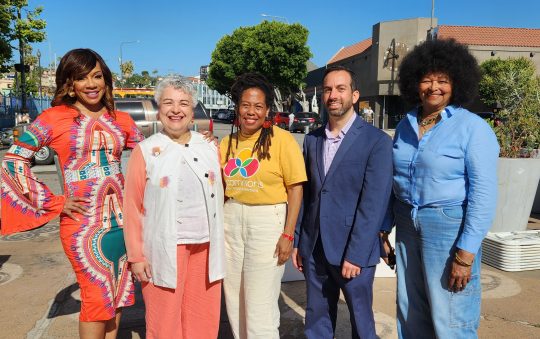Focus Group Aims to Produce More Black Carpenters

Prospective carpenters and hiring contractors gathered in downtown Los Angeles on March 26, at 6 a.m., as the Southwest Carpenters held their first post-pandemic Carpenter’s Combine Day at L.A. Trade Technical College.
The event was open to the public for anyone interested in a career in construction as a union carpenter and for members of Southwest Carpenters who are in need of work. More than 1,000 people showed up to test their skills in front of 100-plus contractors, who were hiring for top projects in L.A. and beyond.

Contractors in attendance included Skanska, Hathaway Dinwiddie, PCL, Penta Building Group, and Largo Concrete, who evaluated candidates as they tested in an eight-station skills camp. The skills camp stations included 4×4 carrying, scaffold assembly, drywall etching, tape measure, screw off, hammering, plywood carry, and corbel mounting.
With increasing real estate developments across Southern California and the Olympics coming to Los Angeles, there is a high need for trained union carpenters, which is a great opportunity for people looking to start or restart a career with solid wages, strong benefits, health care, vacation pay, including a pension.

Despite all the ups to the field, according to Corey Crockerham, Southwest Carpenters representative and chair of the African American Task Force, there is a low number of African Americans involved in the industry.
To balance the scales, the African American Task Force and the Southwest Regional Council of Carpenters, in partnership with the Training Fund, offers the Brothers’ Keeper program, a free four-week carpentry pre-apprenticeship program serving disadvantaged men and women in Los Angeles County, which offers a pathway to a career in carpentry.

The program is open to people from all types of backgrounds. In fact, many Brothers’ Keeper’s graduates were formerly incarcerated and were unable to find steady employment after leaving prison.
“What we do is keep our African American carpenters engaged and mentor them, give them the skills that help them get to the next level,” Crockerham said.
Highlighting the disconnect between opportunity and exposure, he said, “The jobs and opportunities are out there; our mission is to increase the number of African Americans interested and participating in the Carpenter’s Union.”

Wesley Crunk, mentor-in-chief / instructor for the Brother’s Keeper program, trains the candidates at the combine. He was frustrated by the lack of African Americans in attendance.
“There is a great opportunity in this field but our people are not taking advantage of it,” he said. Wesley feels part of the challenge is that African Americans have had little exposure to the carpentry field.
Crunk, who served time in the penitentiary and found himself looking for a new life when he was paroled, found carpentry. “My dad was not a carpenter. I didn’t know what carpentry was when I got into this, but now that I know, I want to spread the word. We have support from our leadership, from our executive board to bring people in the industry who look like us,” he said.

Wesley added that he wants to change the narrative. “We know the numbers are low now but we want to see a progressive change, five, 20, 30 years from now.”
According to Crockerham, participants can come into the apprentice program with little to no experience but must commit to a rigorous four-year program. For those who finish, he said the rewards are high.
“The average income for our journeymen carpenters is about $100,000 with great benefits and retirement,” he said.

Second stage apprentice carpenter Nicholas Vasquez said half the battle is just showing up. “It’s hard work, but it’s rewarding. When I leave the job site and complete a project within the job site, I am proud of my work. I write my name on a stud or drywall, so they know it was me,” he said.
But more importantly, as a younger man with a bright future, Vasquez feels he has something much bigger than a job. “Not only am I immersed in a strong brotherhood and sisterhood, but to be able to have a roof over my head, groceries in the refrigerator, and to help provide for my family by doing carpentry, is proof that hard work pays off,” he said. “This is a lifestyle.”

Brother’s Keeper meets regularly and councils up-and-coming carpenters, giving them the tools and resources to continue in the four-year apprentice program. To learn more about opportunities in carpentry, visit www.swcarpenters.org









